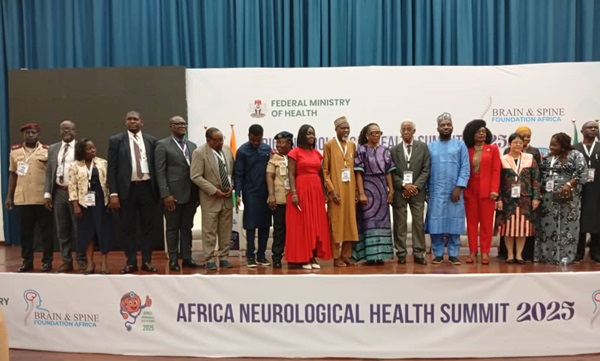
The Federal Government has unveiled a sweeping strategy to transform neurological healthcare delivery across Nigeria, marking a major step in the country’s commitment to addressing brain and spine health challenges in line with global standards.
The announcement was made by the special adviser to the president on health, Dr. Salma Anas during the opening ceremony of the maiden Africa Neurological Health Summit 2025, held in Abuja. She was represented at the event by her technical adviser, Dr. Ahmed Yakasa.
The summit, themed “Policy and Advocacy in Neurological Healthcare: Bridging the Gap Towards Achieving WHO-IGAP Goals 2022–2031,” convened leading neurologists, health policymakers, researchers, advocacy groups and development partners from across the African continent. It served as a platform to explore sustainable solutions to the growing burden of neurological disorders in Africa.
Anas said the Tinubu-led administration is adopting a five-pronged strategy to guide the country’s response over the next decade, in alignment with the Renewed Hope Health Agenda. She emphasised the urgent need to overhaul the nation’s neuro-care architecture, noting that conditions such as epilepsy, stroke, traumatic spinal injuries and other neurological disorders continue to place a significant strain on Nigeria’s health systems and economic productivity.
“This summit must not be a talk shop. We must use it to accelerate policy implementation that brings real solutions to patients and families living with neurological conditions,” she said.
The Federal Government’s new neurological health agenda, she revealed, will be driven by five core focus areas:
First, a National Neurological Health Framework will be established to standardise care protocols, track performance through outcome indicators and streamline service delivery at all levels of the health system.
Second, workforce and infrastructure development will be scaled up, with targeted training programmes and improved deployment of specialists, alongside upgrades to equipment, particularly in underserved primary and secondary facilities.
Third, the government plans to expand health financing, introducing a specialised neurology benefit package under the National Health Insurance Scheme (NHIS), to reduce the financial burden on patients and increase access to critical care.
Fourth, the strategy will deploy tele-neurology and digital health tools to bridge diagnostic and consultation gaps, enabling remote monitoring and care for patients in hard-to-reach areas.
Fifth, brain health equity and inclusion will be advanced through sustained public awareness campaigns and partnerships with civil society organisations to reduce stigma and promote patient rights.
Anas disclosed that three new neurological centres had been established in Kano, Port Harcourt and Maiduguri in 2025, equipped to manage priority conditions such as epilepsy and stroke. The centres are supported by nearby university teaching hospitals to enhance training pipelines for neurologists and allied health professionals.
She stressed the need for a cross-sector response, urging state governments to prioritise investment in neurological services at the sub-national level and calling on health insurance providers to fully integrate neuro-care into their benefit packages.
“Global partners must support Nigeria’s vision by funding research, digital innovations and capacity-building efforts. We must move from pity and stigma to hope and empowerment,” she said.
The presidential adviser said Nigeria’s new commitments align closely with the World Health Organisation’s Intersectoral Global Action Plan (IGAP) 2022–2031, a global roadmap aimed at improving access to care and reducing the burden of neurological disorders through coordinated, evidence-based interventions.
In her goodwill remarks, team lead for communicable and non-communicable diseases at the WHO Nigeria Office, Dr Mya Ngon reaffirmed the organisation’s support for Nigeria’s brain and spine health agenda.
Ngon said WHO is committed to working with Nigeria’s Federal Ministry of Health, its agencies and development partners to scale up interventions for the prevention, management and rehabilitation of neurological conditions.
“This is an opportunity to create consensus and ensure that people living with neurological conditions, especially in Africa, receive quality care and support throughout their journey,” she said.
Ngon highlighted the critical role of partnerships in consolidating gains across the continent and improving overall health outcomes. She described the summit as a turning point for intersectoral collaboration and promised that WHO would continue to back Nigeria’s efforts with technical support and resource mobilisation.
The summit, which continues with technical sessions, expert panels and roundtables, is expected to culminate in the development of a concrete roadmap for transforming neurological healthcare in Nigeria and beyond.
The event ended with a united call for bold, measurable and time-bound actions to reposition brain and spine health as a national and continental health priority.
Delegates at the summit included neurologists, researchers, government officials, community-based organisations and advocacy groups working on epilepsy, brain injury, stroke, neurodevelopmental conditions and mental health. All expressed a shared commitment to the WHO’s IGAP goals and to forging a new chapter in neurological healthcare for Africa.

